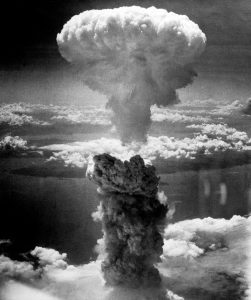
With Russian nuclear arms set to high alert, and Ukraine’s nuclear reactor at risk of being bombed, the danger of a nuclear catastrophe has become very real. Everyone knows that if such a disaster were to happen, no one would win, and the results would be horrendous to all of humanity, but the ego knows no boundaries. When people are set on their own victory, nothing will stop them, not even their own physical demise.
We think of war as a clash between two (or more) physical entities, such as countries or heads of state. However, a war is a much deeper process than a conflict of interests or a power struggle. What drives wars, especially today, is the ego, and the ego does not yield to anything and listens only to itself.
The force that creates life is a force of balance, harmony, and giving. This is how it enables the creation of life, the evolution of increasingly complex creations, which survive through the collaboration and interdependence among all their parts. Therefore, life requires harmony and mutual support.
The ego is the exact opposite of that: It is a force that sees only itself, thinks only of itself, and cares only for itself. The only time the ego relates to others is when it can exploit or harm them, and thereby assert its superiority. As a result, the ego is the opposite of life.
When two or more egos clash, it creates a violent conflict, or a war. A war between two egos can end when one of them has been defeated, or when both are too exhausted to continue, so they agree to “make peace.” In truth, the “peace” is merely a truce, which will last only until one ego feels it has recuperated enough to have the power to annihilate the other, at which time it will resume the fighting. And if demolishing nuclear reactors or using nuclear weapons are required in order to defeat the enemy, the ego will readily use them.
It has nothing to do with who is in power. There are no righteous people when it comes to egoism; we are all villains in potential, since it is human nature to behave this way.
My teacher’s father, the great kabbalist and thinker Baal HaSulam, wrote about the insatiability of the ego back in the 1930s. In his momentous essay “Peace in the World,” he wrote, “In simple words, we will say that the nature of each and every person is to exploit the lives of all other people in the world for his own benefit, and all that he gives to another is only out of necessity. Even then, there is exploitation of others in it, but it is done cunningly, so his friend will not notice it and concede willingly.” Also, he adds, one “feels that all the people in the world should be under his own governance and for his own private benefit. This is an unbreakable law. The only difference is in people’s choices: One chooses to exploit people by obtaining lowly lusts, and one by obtaining governance, while the third by obtaining respect. Furthermore, if one could do it without much effort, he would agree to exploit the world with all three together—wealth, governance, and respect. However, he is forced to choose according to his possibilities and capabilities.”
Ninety years ago, when Baal HaSulam wrote these poignant words, World War II and the horrors it brought with it had not yet happened. Today, can a reasonable person doubt the power of the ego to destroy everything that stands in its way?
I do not think that the war in Ukraine will lead to a world war or to the use of nuclear arms. At least it does not seem that way right now. However, if we do not learn how to use the ego constructively rather than destructively, there is no doubt that we will find ourselves in that horrible situation for the third time. And if we do not learn the lesson, even a fourth war is possible.
To prevent complete destruction, we must teach ourselves new values—that connection and unity are more important than any form of separation and enmity. Just as our environment currently teaches us to hate and strive to dominate, we should build an environment that teaches the opposite.
I am not an educator, and I have no intention to detail specifically how this should be done. All I do know is that unless we learn how to connect with one another and truly care for our neighbors, we will destroy each other.
If we opt for war, says Baal HaSulam in another seminal composition, “The bombs will do their thing, and the relics who remain after the ruin will have no other choice but to take upon themselves this work where both individuals and nations will not work for themselves more than is necessary for their sustenance, while everything else they do will be for the benefit of others” (The Writings of the Last Generation, Part One).
Photo Caption:
1945 ,9 august, JAPAN : The United States Army Air Forces ( USAAF) dropped an #ATOMIC BOMB on NAGASAKI , JAPAN , near the end of World War II . – ATTACCO ATOMICO NUCLEARE – NUCLEAR ATTACK – WORLD WAR II – WWII
Posted on The Times of Israel, Facebook, LinkedIn